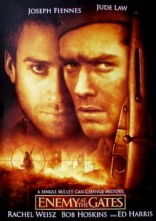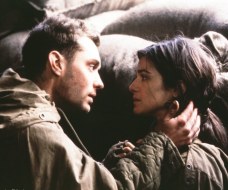|
Enemy at the Gates
|
| |
 |
USA/UK/Germany/Ireland,
2001. Rated R. 131 minutes.
Cast: Jude
Law, Joseph Fiennes, Rachel Weisz, Ed Harris, Bob Hoskins, Ron Perlman,
Gabriel Thomson, Eva Mattes, Matthias Habich, Sophie Rois
Writers: Jean-Jacques Annaud, Alain Godard
Music: James Horner
Cinematographer: Robert Fraisse
Producers: Jean-Jacques Annaud, John D. Schofield
Director: Jean-Jacques Annaud
LINKS
|
 he
promotional trailer for Enemy at the Gates comes very close to suggesting
that one heroic sniper made the difference at the Battle of Stalingrad, which
halted the Germans' advance into the Soviet Union and marked the turning point
of World War Two. Of course, such a suggestion is absurd. Stalingrad was a meatgrinder;
the five-month siege left over a million dead on both sides. If any one thing
was responsible for the German defeat, it was Hitler's obstinacy and arrogant
belief that the German army was invincible. No one soldier made a difference
on the field of battle.
he
promotional trailer for Enemy at the Gates comes very close to suggesting
that one heroic sniper made the difference at the Battle of Stalingrad, which
halted the Germans' advance into the Soviet Union and marked the turning point
of World War Two. Of course, such a suggestion is absurd. Stalingrad was a meatgrinder;
the five-month siege left over a million dead on both sides. If any one thing
was responsible for the German defeat, it was Hitler's obstinacy and arrogant
belief that the German army was invincible. No one soldier made a difference
on the field of battle.
Fortunately, Enemy at the Gates itself makes no such suggestion. It's
a slightly more sophisticated film than that. It argues that, even if they're
not truly necessary to win a modern war, people need heroes. Countries need
heroes. Heroes do exist. It argues that, even if regimes are vicious and corrupt,
battles can still be worth fighting.
Influenced by both Titanic and Saving
Private Ryan, Enemy at the Gates is a story of individual conflicts
and love affairs set against the backdrop of a horrible, tragic battle. Like Titanic,
Enemy at the Gates features a possibly ill-fated romance between people
from different worlds thrown together by circumstance. Like Saving Private
Ryan, Enemy at the Gates opens with a segment that unflinchingly
examines the shockingly brutal battleground instead of glorifying it. Having
established the setting, Enemy at the Gates then follows two storylines:
how Russian sniper Vasily Zaitsev (Jude Law) becomes as a national hero and
eventually duels the German's top sniper, Major Koenig (Ed Harris), and Zaitsev's
love affair with female sniper Tania Chernova (Rachel Weisz). Oddly, given how
stories are usually rewritten for movies, historical records show that the sniper
duel is almost certainly fiction, while the love affair is a true story, give
or take a Hollywood ending.
affairs set against the backdrop of a horrible, tragic battle. Like Titanic,
Enemy at the Gates features a possibly ill-fated romance between people
from different worlds thrown together by circumstance. Like Saving Private
Ryan, Enemy at the Gates opens with a segment that unflinchingly
examines the shockingly brutal battleground instead of glorifying it. Having
established the setting, Enemy at the Gates then follows two storylines:
how Russian sniper Vasily Zaitsev (Jude Law) becomes as a national hero and
eventually duels the German's top sniper, Major Koenig (Ed Harris), and Zaitsev's
love affair with female sniper Tania Chernova (Rachel Weisz). Oddly, given how
stories are usually rewritten for movies, historical records show that the sniper
duel is almost certainly fiction, while the love affair is a true story, give
or take a Hollywood ending.
The duel with Koenig, however, is not a tall tale written by the screenwriters,
but fiction invented by the Soviet propaganda machine, represented in the film
by political officer Danilov (Joseph Fiennes). Even though it portrays the duel
as a true story, Enemy at the Gates does a passable job of showing how
heroes are manufactured and legends created. Enemy at the Gates does
portray Zaitsev as a hero (this is a movie, after all), but not exactly the
same hero depicted by the Soviet press. The most egregious fiction perpetrated
by the film is not any of Zaitsev's achievements, but the shameless, embarrassingly
manipulative use of a young boy, Sasha (Gabriel Thomson), who shuttles back
and forth between the lines as a spy, to play on the emotions of the audience.
Of course, creating an accurate historical document or a thoughtful meditation
on the psychology of war is not Enemy's raison d'ętre. The goal
is entertainment, pure and simple, and Enemy at the Gates delivers the
escapist goods. Director Jean-Jacques Annaud, whose films (Seven Years in
Tibet, The Bear, The Name of the Rose) always look good even if they
are not actually good, builds an impressively complex battleground in
the heart of a destroyed city. The sniper cat-and-mouse is particularly well
conceived. It's a challenge to make such a motionless activity engrossing and
thrilling, but Annaud succeeds with sharp camerawork and tight editing.
AboutFilm.Com
The Big Picture
|
| Alison |
-
|
| Carlo |
B-
|
| Claudia |
-
|
| Dana |
C+
|
| Jeff |
B-
|
| ratings explained |
The caliber of the acting helps. Although he's not quite intense enough, Jude
Law has talent to back up his pretty-boy looks, and Ed Harris controls the screen
with his steely villain--quite a contrast from his recent turn as the volatile
and vulnerable Jackson Pollock. Joseph Fiennes' acting is not quite at the same
level, particularly because his character is at the center of some sloppily
written scenes. He's more than adequate, however, and will only get better with
experience. Though her performance is unremarkable, Weisz is an appealing love
interest. Bob Hoskins also stands out as a certain bald commander who would
go on to become Premier of the Soviet Union and put missiles in Cuba.
After opening as a daring epic, Enemy at the Gates becomes far narrower
in scope and a more traditional war film during its second hour. Though the
film is logically uneven and misses the opportunity to tell the story of a fascinating
and historically crucial conflict, it's not the worst two hours spent at the
movies… especially when one considers the inane action/adventure movies that
will likely be polluting multiplexes by Memorial Day.
Review © March 2001 by
AboutFilm.Com and the author.
Images © 2001 Paramount Pictures and MP Film Management DOS Productions
GMBH & CO. KG, Swanford Films Limited and Little Bird Limited. All Rights Reserved.

 affairs set against the backdrop of a horrible, tragic battle. Like Titanic,
Enemy at the Gates features a possibly ill-fated romance between people
from different worlds thrown together by circumstance. Like Saving Private
Ryan, Enemy at the Gates opens with a segment that unflinchingly
examines the shockingly brutal battleground instead of glorifying it. Having
established the setting, Enemy at the Gates then follows two storylines:
how Russian sniper Vasily Zaitsev (Jude Law) becomes as a national hero and
eventually duels the German's top sniper, Major Koenig (Ed Harris), and Zaitsev's
love affair with female sniper Tania Chernova (Rachel Weisz). Oddly, given how
stories are usually rewritten for movies, historical records show that the sniper
duel is almost certainly fiction, while the love affair is a true story, give
or take a Hollywood ending.
affairs set against the backdrop of a horrible, tragic battle. Like Titanic,
Enemy at the Gates features a possibly ill-fated romance between people
from different worlds thrown together by circumstance. Like Saving Private
Ryan, Enemy at the Gates opens with a segment that unflinchingly
examines the shockingly brutal battleground instead of glorifying it. Having
established the setting, Enemy at the Gates then follows two storylines:
how Russian sniper Vasily Zaitsev (Jude Law) becomes as a national hero and
eventually duels the German's top sniper, Major Koenig (Ed Harris), and Zaitsev's
love affair with female sniper Tania Chernova (Rachel Weisz). Oddly, given how
stories are usually rewritten for movies, historical records show that the sniper
duel is almost certainly fiction, while the love affair is a true story, give
or take a Hollywood ending.
